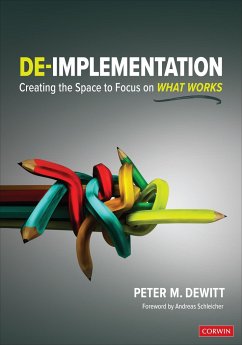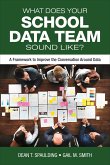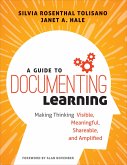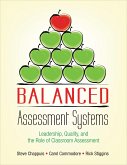Peter M. M. DeWitt (Corwin Author and Consultant)
De-Implementation
Creating the Space to Focus on What Works
Peter M. M. DeWitt (Corwin Author and Consultant)
De-Implementation
Creating the Space to Focus on What Works
- Broschiertes Buch
- Merkliste
- Auf die Merkliste
- Bewerten Bewerten
- Teilen
- Produkt teilen
- Produkterinnerung
- Produkterinnerung
When it comes to school initiatives, more isn't always better. Today's educators are buried under old practices, new ideas, and recommended initiatives. Before you're tempted to add just one more idea to the pile, take a step back-and an objective look-so that you and your teachers can decide which practices to keep, which to modify, and which to eliminate altogether. This guide provides: * A research- and evidence-based framework for determining efficacy * Practical steps for removing, reducing, or replacing ineffective practices * Action steps, examples, and tips for beginning the work *…mehr
Andere Kunden interessierten sich auch für
![Education Sector Plans and Their Implementation in Developing Countries Education Sector Plans and Their Implementation in Developing Countries]() Roy Carr-HillEducation Sector Plans and Their Implementation in Developing Countries157,99 €
Roy Carr-HillEducation Sector Plans and Their Implementation in Developing Countries157,99 €![What Does Your School Data Team Sound Like? What Does Your School Data Team Sound Like?]() Dean T. SpauldingWhat Does Your School Data Team Sound Like?40,99 €
Dean T. SpauldingWhat Does Your School Data Team Sound Like?40,99 €![Education Sector Plans and their Implementation in Developing Countries Education Sector Plans and their Implementation in Developing Countries]() Roy Carr-HillEducation Sector Plans and their Implementation in Developing Countries38,99 €
Roy Carr-HillEducation Sector Plans and their Implementation in Developing Countries38,99 €![A Guide to Documenting Learning A Guide to Documenting Learning]() Silvia Rosenthal TolisanoA Guide to Documenting Learning39,99 €
Silvia Rosenthal TolisanoA Guide to Documenting Learning39,99 €![Balanced Assessment Systems Balanced Assessment Systems]() Stephen J. ChappuisBalanced Assessment Systems46,99 €
Stephen J. ChappuisBalanced Assessment Systems46,99 €![Reach the Highest Standard in Professional Learning: Data Reach the Highest Standard in Professional Learning: Data]() Reach the Highest Standard in Professional Learning: Data23,99 €
Reach the Highest Standard in Professional Learning: Data23,99 €![Equity Audits and School Resource Allocation Equity Audits and School Resource Allocation]() William A. Owings (USA Old Dominion University)Equity Audits and School Resource Allocation56,99 €
William A. Owings (USA Old Dominion University)Equity Audits and School Resource Allocation56,99 €-
-
-
When it comes to school initiatives, more isn't always better. Today's educators are buried under old practices, new ideas, and recommended initiatives. Before you're tempted to add just one more idea to the pile, take a step back-and an objective look-so that you and your teachers can decide which practices to keep, which to modify, and which to eliminate altogether. This guide provides: * A research- and evidence-based framework for determining efficacy * Practical steps for removing, reducing, or replacing ineffective practices * Action steps, examples, and tips for beginning the work * Templates for charting your school's individual path to de-implementation
Hinweis: Dieser Artikel kann nur an eine deutsche Lieferadresse ausgeliefert werden.
Hinweis: Dieser Artikel kann nur an eine deutsche Lieferadresse ausgeliefert werden.
Produktdetails
- Produktdetails
- Verlag: SAGE Publications Inc
- Seitenzahl: 160
- Erscheinungstermin: 20. Juni 2022
- Englisch
- Abmessung: 254mm x 175mm x 10mm
- Gewicht: 316g
- ISBN-13: 9781071885215
- ISBN-10: 1071885219
- Artikelnr.: 63695814
- Herstellerkennzeichnung
- Libri GmbH
- Europaallee 1
- 36244 Bad Hersfeld
- gpsr@libri.de
- Verlag: SAGE Publications Inc
- Seitenzahl: 160
- Erscheinungstermin: 20. Juni 2022
- Englisch
- Abmessung: 254mm x 175mm x 10mm
- Gewicht: 316g
- ISBN-13: 9781071885215
- ISBN-10: 1071885219
- Artikelnr.: 63695814
- Herstellerkennzeichnung
- Libri GmbH
- Europaallee 1
- 36244 Bad Hersfeld
- gpsr@libri.de
Peter DeWitt (Ed.D) is the founder and CEO of the Instructional Leadership Collective. He was a K-5 teacher for 11 years and a principal for 8 years. For the last 10 years, he has been facilitating professional learning nationally, and internationally, based on the content of many of his best-selling educational books. DeWitt¿s professional learning relationships are a monthly hybrid approach that includes both coaching and the facilitating workshops on instructional leadership and collective efficacy. Additionally, in the Summer of 2021, DeWitt created a year long on-demand, asynchronous coaching course through Thinkific where he has created a community of learners that include k-12 educators in leadership positions. DeWitt¿s work has been adopted at the state level, university level, and he works with numerous school districts, school boards, regional networks, ministries of education around North America, Australia, Europe, Asia, the Middle East and the U.K. Peter writes the Finding Common Ground column for Education Week, which has been in circulation since 2011. In 2020 DeWitt co-created Education Week¿s A Seat At the Table where he moderates conversations with experts around the topics of race, gender, sexual orientation, research, trauma and many other educational topics. Additionally, DeWitt is the Series Editor for the Connected Educator Series (Corwin Press) and the Impact Series (Corwin Press) that include books by Viviane Robinson, Andy Hargreaves, Pasi Sahlberg, Yong Zhao and Michael Fullan. He is the 2013 School Administrators Association of New York State¿s (SAANYS) Outstanding Educator of the Year, and the 2015 Education Blogger of the Year (Academy of Education Arts & Sciences), and sits on numerous advisory boards. Peter is the author, co-author or contributor of numerous books. Click on title to purchase. They include: Dignity for All: Safeguarding LGBT Students (Corwin Press. 2012). Flipping Leadership Doesn¿t Mean Reinventing the Wheel (Corwin Press. 2014) Collaborative Leadership: 6 Influences That Matter Most (Corwin Press/Learning Forward). School Climate: Leading With Collective Teacher Efficacy (Corwin Press/ Ontario Principals Council. 2017). Coach It Further: Using the Art of Coaching to Improve School Leadership (Corwin Press. 2018). Instructional Leadership: Creating Practice Out Of Theory (Corwin Press. 2020). Collective Leader Efficacy: Strengthening the Impact of Instructional Leadership Teams (Corwin Press. Learning Forward. 2021). De-implementation: Creating the Space to Focus on What Works (Corwin Press. 2022). Leading with Intention - Developing self-awareness to fostering an unreasonable human interconnectedness to impact the school community (co-authored with Michael Nelson. Corwin Press. 2024). Peter¿s articles have appeared in educational research journals at the state, national and international level. His books have been translated into numerous languages. Some of the organizations Peter has worked with are the American Association of School Administrators (AASA), Learning Forward, National Association of Elementary School Principals (NAESP), University of Oklahoma, Cognition Education (New Zealand), Australian Council for Educational Leaders (ACEL), Victoria Department of Education (Australia), University of Rotterdam (Netherlands), Washington Association of School Administrators (WASA), Texas Association of School Administrators (TASA), the National Education Association (NEA), New Brunswick Teacher¿s Association (Canada), the National Association of Secondary School Principals (NASSP), Education Scotland (Scotland), Glasgow City Council (Scotland), Kuwait Technical College (Kuwait) the National Association of School Psychologists, ASCD, l'Association des directions et directions adjointes des écoles franco-ontariennes (ADFO), the Catholic Principals' Council of Ontario (CPCO), and the Ontario Principals' Council (OPC), National School Climate Center, GLSEN, PBS, NPR, BAM Radio Network, ABC, and NBC¿s Education Nation. Learn more about bringing Peter DeWitt to your school or district at petermdewitt.com
Foreword
Acknowledgments
About the Author
Introduction
What Are Educators Interested in De-implementing?
Chapter 1: The Trouble With Implementation (and how to make it better)
Educational Trends Over the Past Thirty Years
Five Reasons We Over-Implement
Improving Implementation
A Quick Guide for Good Implementation
Addressing Our Assumptions
Anticipating Roadblocks
Monitoring Our Minds-Mindset
In the End
Discussion Questions
Chapter 2: The De-implementation Research (with practical adaptations)
Defining De-implementation
Two Types of De-implementation
Formal and Informal De-implementation
Anticipating Roadblocks
Monitoring Our Minds: Unlearning and Relearning
In the End
Discussion Questions
Chapter 3: What Gets De-implemented (based on reflection and evidence)
Partial Reduction
Replacement Actions
The Foundations of Your De-implementation Plan
Criteria for What Gets De-implemented
Gathering Evidence
Gathering Questions
Anticipating Roadblocks
Monitoring Our Minds: Locus of Control
In the End
Discussion Questions
Chapter 4: The Cycle of De-implementation (for big ideas around school
change)
The Cycle of De-implementation
Sometimes Slow Is Fast
Anticipating Roadblocks
Monitoring Our Minds: Filling the Void
In the End
Discussion Questions
Chapter 5: Your Team's De-implementation Process (considering who you need
and how fast to go)
This Chapter
Part I: Your Team
Pacing and Agendas
Part II: Your Official Cycle of De-implementation
Anticipating Roadblocks
Monitoring Our Minds: Well-Being
In the End
Discussion Questions
One Final Activity
References
Acknowledgments
About the Author
Introduction
What Are Educators Interested in De-implementing?
Chapter 1: The Trouble With Implementation (and how to make it better)
Educational Trends Over the Past Thirty Years
Five Reasons We Over-Implement
Improving Implementation
A Quick Guide for Good Implementation
Addressing Our Assumptions
Anticipating Roadblocks
Monitoring Our Minds-Mindset
In the End
Discussion Questions
Chapter 2: The De-implementation Research (with practical adaptations)
Defining De-implementation
Two Types of De-implementation
Formal and Informal De-implementation
Anticipating Roadblocks
Monitoring Our Minds: Unlearning and Relearning
In the End
Discussion Questions
Chapter 3: What Gets De-implemented (based on reflection and evidence)
Partial Reduction
Replacement Actions
The Foundations of Your De-implementation Plan
Criteria for What Gets De-implemented
Gathering Evidence
Gathering Questions
Anticipating Roadblocks
Monitoring Our Minds: Locus of Control
In the End
Discussion Questions
Chapter 4: The Cycle of De-implementation (for big ideas around school
change)
The Cycle of De-implementation
Sometimes Slow Is Fast
Anticipating Roadblocks
Monitoring Our Minds: Filling the Void
In the End
Discussion Questions
Chapter 5: Your Team's De-implementation Process (considering who you need
and how fast to go)
This Chapter
Part I: Your Team
Pacing and Agendas
Part II: Your Official Cycle of De-implementation
Anticipating Roadblocks
Monitoring Our Minds: Well-Being
In the End
Discussion Questions
One Final Activity
References
Foreword
Acknowledgments
About the Author
Introduction
What Are Educators Interested in De-implementing?
Chapter 1: The Trouble With Implementation (and how to make it better)
Educational Trends Over the Past Thirty Years
Five Reasons We Over-Implement
Improving Implementation
A Quick Guide for Good Implementation
Addressing Our Assumptions
Anticipating Roadblocks
Monitoring Our Minds-Mindset
In the End
Discussion Questions
Chapter 2: The De-implementation Research (with practical adaptations)
Defining De-implementation
Two Types of De-implementation
Formal and Informal De-implementation
Anticipating Roadblocks
Monitoring Our Minds: Unlearning and Relearning
In the End
Discussion Questions
Chapter 3: What Gets De-implemented (based on reflection and evidence)
Partial Reduction
Replacement Actions
The Foundations of Your De-implementation Plan
Criteria for What Gets De-implemented
Gathering Evidence
Gathering Questions
Anticipating Roadblocks
Monitoring Our Minds: Locus of Control
In the End
Discussion Questions
Chapter 4: The Cycle of De-implementation (for big ideas around school
change)
The Cycle of De-implementation
Sometimes Slow Is Fast
Anticipating Roadblocks
Monitoring Our Minds: Filling the Void
In the End
Discussion Questions
Chapter 5: Your Team's De-implementation Process (considering who you need
and how fast to go)
This Chapter
Part I: Your Team
Pacing and Agendas
Part II: Your Official Cycle of De-implementation
Anticipating Roadblocks
Monitoring Our Minds: Well-Being
In the End
Discussion Questions
One Final Activity
References
Acknowledgments
About the Author
Introduction
What Are Educators Interested in De-implementing?
Chapter 1: The Trouble With Implementation (and how to make it better)
Educational Trends Over the Past Thirty Years
Five Reasons We Over-Implement
Improving Implementation
A Quick Guide for Good Implementation
Addressing Our Assumptions
Anticipating Roadblocks
Monitoring Our Minds-Mindset
In the End
Discussion Questions
Chapter 2: The De-implementation Research (with practical adaptations)
Defining De-implementation
Two Types of De-implementation
Formal and Informal De-implementation
Anticipating Roadblocks
Monitoring Our Minds: Unlearning and Relearning
In the End
Discussion Questions
Chapter 3: What Gets De-implemented (based on reflection and evidence)
Partial Reduction
Replacement Actions
The Foundations of Your De-implementation Plan
Criteria for What Gets De-implemented
Gathering Evidence
Gathering Questions
Anticipating Roadblocks
Monitoring Our Minds: Locus of Control
In the End
Discussion Questions
Chapter 4: The Cycle of De-implementation (for big ideas around school
change)
The Cycle of De-implementation
Sometimes Slow Is Fast
Anticipating Roadblocks
Monitoring Our Minds: Filling the Void
In the End
Discussion Questions
Chapter 5: Your Team's De-implementation Process (considering who you need
and how fast to go)
This Chapter
Part I: Your Team
Pacing and Agendas
Part II: Your Official Cycle of De-implementation
Anticipating Roadblocks
Monitoring Our Minds: Well-Being
In the End
Discussion Questions
One Final Activity
References








